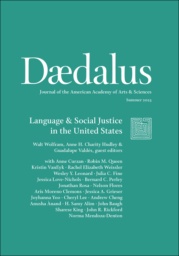

Refusing “Endangered Languages” Narratives (2023)
by Wesley Y. Leonard


Most important, and also a reflection of colonialism, is that the narrative deemphasizes why language endangerment is occurring on the unprecedented scale that it is. Indeed, a common statement is that Native American languages are 'quickly disappearing,' and that 'a language dies when people stop speaking it.' Such tautologies are not helpful. Borrowing conceptually from Newton's principle that objects in motion stay in motion unless an external force acts upon them, Chikasaw linguist Jenny L. Davis observes that intergenerational transmission of languages continues over time unless an external force disrupts this process. By extension, the external forces should be the focus, yet the dominant narrative largely does not reflect this.🏁
Global Leaderboard
| # | Player | Time | Duration | Accuracy | WPM | pp | |
|---|---|---|---|---|---|---|---|
| 1 | |||||||
| 2 | |||||||
| 3 | |||||||
| 4 | |||||||
| 5 | |||||||
| 6 | |||||||
| 7 | |||||||
| 8 | |||||||
| 9 | |||||||
| 10 |


Most important, and also a reflection of colonialism, is that the narrative deemphasizes why language endangerment is occurring on the unprecedented scale that it is. Indeed, a common statement is that Native American languages are 'quickly disappearing,' and that 'a language dies when people stop speaking it.' Such tautologies are not helpful. Borrowing conceptually from Newton's principle that objects in motion stay in motion unless an external force acts upon them, Chikasaw linguist Jenny L. Davis observes that intergenerational transmission of languages continues over time unless an external force disrupts this process. By extension, the external forces should be the focus, yet the dominant narrative largely does not reflect this.🏁